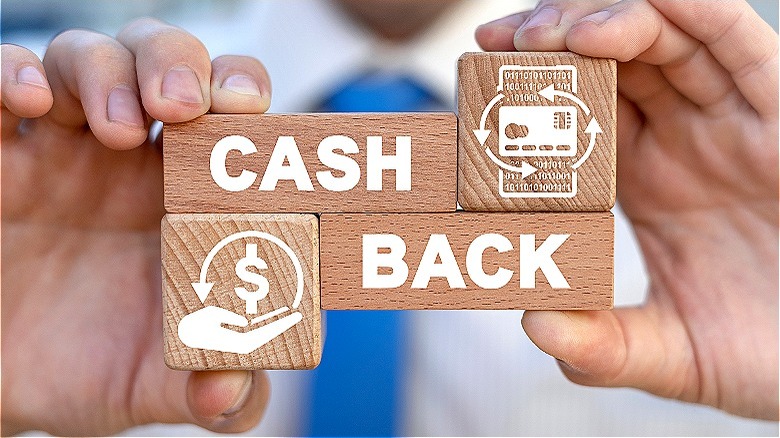The One Type Of Credit Card You Should Almost Always Avoid
Saving money on purchases is always a good thing, particularly around the holidays when cash is often tight. That could lead to the temptation to apply for store-branded credit cards, which are frequently pushed on shoppers during the checkout process. But are they really the great deal store employees make them out to be?
While an initial discount of 10%, 20%, or more on your first purchase with the card might seem worthwhile, it's really not that substantial compared to certain other credit card sign-up bonuses unless you're making a massive purchase on the day that you apply. You might also be lured in with a promise of 0% interest and delayed payments, but be careful. If the balance isn't paid in full by the end of the 0% interest period, you could be on the hook for paying deferred interest at an outrageous rate — sometimes 30% or more.
Standing in line at the checkout counter is seldom the best place to make important financial decisions, so let's take a better look at why restricted store credit cards (not co-branded credit cards with a Visa or a Mastercard logo, for example) might be worth avoiding.
Make sure it's worth your while
When opening a new credit card, you should be seeking two things: a generous bonus for signing up and rewards for continuing to use the card. With store credit cards, the initial bonus is typically a sizable discount on goods purchased in the store on the day you sign up for the card. Unless you're making a very large purchase, though, that one-time discount won't amount to much. For example, the department store Kohl's offers a 35% discount with credit card sign-up. That might seem significant, but even if you spend $300 on clothes, that's only a $105 bonus.
Similarly, home improvement retailer Lowe's offers new credit card customers a 20% discount, but it's capped at a maximum value of $100. That means that any portion of a Lowe's purchase greater than $500 isn't eligible for the discount. By comparison, some of the most generous cash-back credit cards offer points worth $200 to $300 just for signing up (and meeting a spending threshold within a set period of time, e.g., $500 in purchases in the first three months). If you're into traveling, travel rewards credit card can be even more lucrative, with bonuses worth $750 or more when spent on flights or hotels.
Besides the initial sign-up bonus, store cards may have some additional ongoing perks, but they're typically negligible. An example would be free shipping, which is reliably available to all customers during promotional periods and/or if certain spending thresholds are met. There are some worthwhile exceptions, though. For instance, Target's REDcard and Lowe's Advantage card both offer a 5% discount to cardholders all the time on most purchases, making them valuable assets to frequent customers of these chains.
Store credit cards may help or hurt your credit rating
Even though store credit cards aren't always the best strategy over the long haul, perhaps you're tempted anyway. Keep in mind that every credit card application results in an inquiry to credit reporting bureaus, sometimes called a "hard pull" on your credit report. Such inquiries will result in an immediate small dip in your credit score (typically three to five points). Further, if your application is approved, the brand new credit card account will also reduce the average age of your overall credit, which can be perceived as a negative.
On the other end of the spectrum, if you don't have a significant credit history, store cards can help you build one. That's because they're usually easier to get approved for than other types of credit cards. Part of the reasoning behind that is that the credit limit is typically lower than regular bank cards.
With all this said, if your favorite retailer's attention-getting signage or the sales clerk's pitch to open a credit card piques your interest (pun intended), you'll be better served to make a mental note to research the terms and conditions after you return home. The offer will still be around when you return to the store or you can likely apply online.


